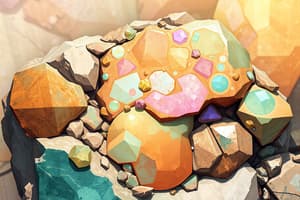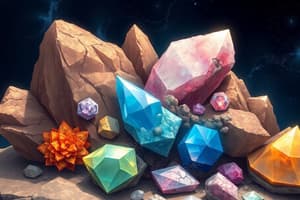Podcast
Questions and Answers
What is the primary purpose of the Mohs Hardness Scale?
What is the primary purpose of the Mohs Hardness Scale?
- To measure the scratch resistance of minerals (correct)
- To categorize minerals based on color
- To arrange minerals by their density
- To identify minerals based on their crystal shape
Which property of minerals refers to how light is reflected from their surface?
Which property of minerals refers to how light is reflected from their surface?
- Streak
- Cleavage
- Luster (correct)
- Color
Which of the following is true regarding the property of streak?
Which of the following is true regarding the property of streak?
- Streak is the color of a mineral in powdered form (correct)
- Streak is always white for all minerals
- Streak refers to the color of a mineral in its crystal form
- Streak can be varied depending on the luster of the mineral
Which mineral is known to have the highest ranking on the Mohs Hardness Scale?
Which mineral is known to have the highest ranking on the Mohs Hardness Scale?
What characteristic of minerals refers to their ability to break along preferred planes?
What characteristic of minerals refers to their ability to break along preferred planes?
Specific gravity is defined as the ratio of which two weights?
Specific gravity is defined as the ratio of which two weights?
Which property is considered less useful for mineral identification despite being obvious?
Which property is considered less useful for mineral identification despite being obvious?
Which term describes the characteristic shape or arrangement of mineral crystals?
Which term describes the characteristic shape or arrangement of mineral crystals?
Flashcards are hidden until you start studying
Study Notes
Minerals and Their Composition
- Minerals consist of one or more chemical elements with a definite chemical composition.
- Unlike rocks, minerals cannot be divided into smaller units with different chemical compositions.
Physical Properties of Minerals
-
Luster: Refers to the way light reflects off a mineral's surface.
-
Hardness:
- Indicates the mineral's ability to resist scratching.
- Measured using the Mohs Hardness Scale, developed by Friedrich Mohs.
- Scale ranges from 1 (softest, talc) to 10 (hardest, diamond).
-
Crystal Form Habit:
- The characteristic shape of an individual mineral crystal or a group of crystals.
-
Color:
- A visible characteristic, but not always reliable for identification.
- Results from the absorption of certain light wavelengths.
-
Streak:
- The color of a mineral in its powdered form.
- Useful for identifying metallic and earthy minerals; non-metallic minerals typically leave a white streak.
- Example: Hematite produces a consistent reddish-brown streak.
-
Cleavage:
- Refers to a mineral's ability to break along preferred planes.
- Cleavage occurs in different dimensions (one to six), which aids in identification.
-
Fracture:
- Describes how a mineral breaks unevenly or irregularly.
-
Specific Gravity:
- Represents the “heaviness” of a mineral.
- Defined as the ratio of the mineral’s weight to the weight of an equal volume of water (water has a specific gravity of 1).
Studying That Suits You
Use AI to generate personalized quizzes and flashcards to suit your learning preferences.




